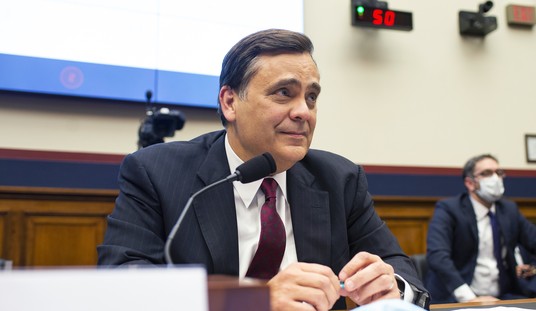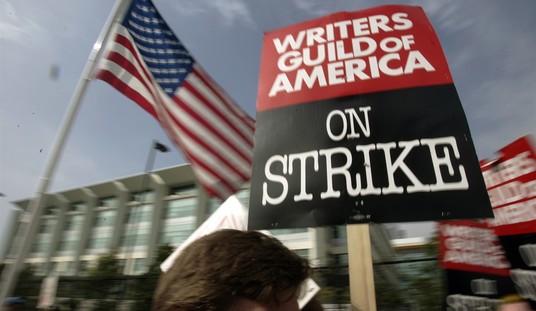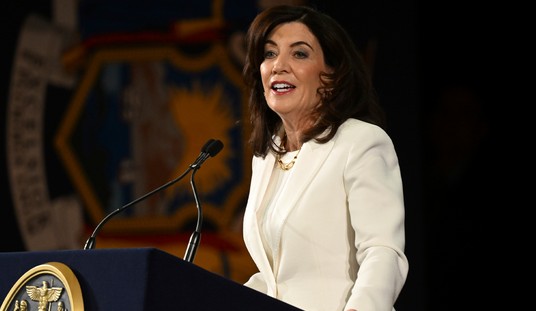
Last week I posted on the ‘cancel culture’ that is turning social media into a playground for psychopaths and my doubts that the impulse of the battalions of losers, misfits, sociopaths, and vicious imbeciles who have nothing better to do that try to get people they don’t know fired from their jobs over some fancied misstatement on Twitter or Facebook is even close to burning out. The post is Boeing Embraces the Cancel Culture By Firing a Senior Executive For a 33-Year-Old Article and it was brought on by the convergence of several events. In June, British novelist J. K. Rowling was very nearly dropped by her publisher over this tweet:
‘People who menstruate.’ I’m sure there used to be a word for those people. Someone help me out. Wumben? Wimpund? Woomud?
Opinion: Creating a more equal post-COVID-19 world for people who menstruate https://t.co/cVpZxG7gaA
— J.K. Rowling (@jk_rowling) June 6, 2020
This whole kerfuffle was brought on by the novel idea that sex is real and that only one of those sexes has a menstrual cycle. The outcry was astonishing and had Rowling, a dyed in the wool anti-Trump leftist, not had the financial clout of her Harry Potter series (I have to admit being stunned at the number of people who actually like that crap but whatever…I wish I’d written it) she would have been driven from publishing and society.
My colleague, RedState editor-at-large Kira Davis gave her thoughts on the issue in Kira Davis: How Do We Cancel ‘Cancel Culture?’
Finally, the story of Boeing firing their vice president for communications over an article he wrote in Proceedings of the Naval Institute three decades ago brought it all together.
Today, Harpers announced that some 150 leftwing luminaries and a smattering of NeverTrumpers had signed a letter decrying the cancel culture. My colleague Nick Arama is somewhat hopeful that this could be the beginning of the end for this noxious practice (READ Have Some on the Left Gone Too Far for Others on the Left? 150 Writers and Academics Sound a Warning).
The is the text of the letter.
A Letter on Justice and Open Debate
July 7, 2020
The below letter will be appearing in the Letters section of the magazine’s October issue. We welcome responses at [email protected]Our cultural institutions are facing a moment of trial. Powerful protests for racial and social justice are leading to overdue demands for police reform, along with wider calls for greater equality and inclusion across our society, not least in higher education, journalism, philanthropy, and the arts. But this needed reckoning has also intensified a new set of moral attitudes and political commitments that tend to weaken our norms of open debate and toleration of differences in favor of ideological conformity. As we applaud the first development, we also raise our voices against the second. The forces of illiberalism are gaining strength throughout the world and have a powerful ally in Donald Trump, who represents a real threat to democracy. But resistance must not be allowed to harden into its own brand of dogma or coercion—which right-wing demagogues are already exploiting. The democratic inclusion we want can be achieved only if we speak out against the intolerant climate that has set in on all sides.
The free exchange of information and ideas, the lifeblood of a liberal society, is daily becoming more constricted. While we have come to expect this on the radical right, censoriousness is also spreading more widely in our culture: an intolerance of opposing views, a vogue for public shaming and ostracism, and the tendency to dissolve complex policy issues in a blinding moral certainty. We uphold the value of robust and even caustic counter-speech from all quarters. But it is now all too common to hear calls for swift and severe retribution in response to perceived transgressions of speech and thought. More troubling still, institutional leaders, in a spirit of panicked damage control, are delivering hasty and disproportionate punishments instead of considered reforms. Editors are fired for running controversial pieces; books are withdrawn for alleged inauthenticity; journalists are barred from writing on certain topics; professors are investigated for quoting works of literature in class; a researcher is fired for circulating a peer-reviewed academic study; and the heads of organizations are ousted for what are sometimes just clumsy mistakes. Whatever the arguments around each particular incident, the result has been to steadily narrow the boundaries of what can be said without the threat of reprisal. We are already paying the price in greater risk aversion among writers, artists, and journalists who fear for their livelihoods if they depart from the consensus, or even lack sufficient zeal in agreement.
This stifling atmosphere will ultimately harm the most vital causes of our time. The restriction of debate, whether by a repressive government or an intolerant society, invariably hurts those who lack power and makes everyone less capable of democratic participation. The way to defeat bad ideas is by exposure, argument, and persuasion, not by trying to silence or wish them away. We refuse any false choice between justice and freedom, which cannot exist without each other. As writers we need a culture that leaves us room for experimentation, risk taking, and even mistakes. We need to preserve the possibility of good-faith disagreement without dire professional consequences. If we won’t defend the very thing on which our work depends, we shouldn’t expect the public or the state to defend it for us.
The are the signatories.
Elliot Ackerman
Saladin Ambar, Rutgers University
Martin Amis
Anne Applebaum
Marie Arana, author
Margaret Atwood
John Banville
Mia Bay, historian
Louis Begley, writer
Roger Berkowitz, Bard College
Paul Berman, writer
Sheri Berman, Barnard College
Reginald Dwayne Betts, poet
Neil Blair, agent
David W. Blight, Yale University
Jennifer Finney Boylan, author
David Bromwich
David Brooks, columnist
Ian Buruma, Bard College
Lea Carpenter
Noam Chomsky, MIT (emeritus)
Nicholas A. Christakis, Yale University
Roger Cohen, writer
Ambassador Frances D. Cook, ret.
Drucilla Cornell, Founder, uBuntu Project
Kamel Daoud
Meghan Daum, writer
Gerald Early, Washington University-St. Louis
Jeffrey Eugenides, writer
Dexter Filkins
Federico Finchelstein, The New School
Caitlin Flanagan
Richard T. Ford, Stanford Law School
Kmele Foster
David Frum, journalist
Francis Fukuyama, Stanford University
Atul Gawande, Harvard University
Todd Gitlin, Columbia University
Kim Ghattas
Malcolm Gladwell
Michelle Goldberg, columnist
Rebecca Goldstein, writer
Anthony Grafton, Princeton University
David Greenberg, Rutgers University
Linda Greenhouse
Kerri Greenidge, historian
Rinne B. Groff, playwright
Sarah Haider, activist
Jonathan Haidt, NYU-Stern
Roya Hakakian, writer
Shadi Hamid, Brookings Institution
Jeet Heer, The Nation
Katie Herzog, podcast host
Susannah Heschel, Dartmouth College
Adam Hochschild, author
Arlie Russell Hochschild, author
Eva Hoffman, writer
Coleman Hughes, writer/Manhattan Institute
Hussein Ibish, Arab Gulf States Institute
Michael Ignatieff
Zaid Jilani, journalist
Bill T. Jones, New York Live Arts
Wendy Kaminer, writer
Matthew Karp, Princeton University
Garry Kasparov, Renew Democracy Initiative
Daniel Kehlmann, writer
Randall Kennedy
Khaled Khalifa, writer
Parag Khanna, author
Laura Kipnis, Northwestern University
Frances Kissling, Center for Health, Ethics, Social Policy
Enrique Krauze, historian
Anthony Kronman, Yale University
Joy Ladin, Yeshiva University
Nicholas Lemann, Columbia University
Mark Lilla, Columbia University
Susie Linfield, New York University
Damon Linker, writer
Dahlia Lithwick, Slate
Steven Lukes, New York University
John R. MacArthur, publisher, writer
Susan Madrak, writer
Phoebe Maltz Bovy, writer
Greil Marcus
Wynton Marsalis, Jazz at Lincoln Center
Kati Marton, author
Debra Maschek, scholar
Deirdre McCloskey, University of Illinois at Chicago
John McWhorter, Columbia University
Uday Mehta, City University of New York
Andrew Moravcsik, Princeton University
Yascha Mounk, Persuasion
Samuel Moyn, Yale University
Meera Nanda, writer and teacher
Cary Nelson, University of Illinois at Urbana-Champaign
Olivia Nuzzi, New York Magazine
Mark Oppenheimer, Yale University
Dael Orlandersmith, writer/performer
George Packer
Nell Irvin Painter, Princeton University (emerita)
Greg Pardlo, Rutgers University – Camden
Orlando Patterson, Harvard University
Steven Pinker, Harvard University
Letty Cottin Pogrebin
Katha Pollitt, writer
Claire Bond Potter, The New School
Taufiq Rahim, New America Foundation
Zia Haider Rahman, writer
Jennifer Ratner-Rosenhagen, University of Wisconsin
Jonathan Rauch, Brookings Institution/The Atlantic
Neil Roberts, political theorist
Melvin Rogers, Brown University
Kat Rosenfield, writer
Loretta J. Ross, Smith College
J.K. Rowling
Salman Rushdie, New York University
Karim Sadjadpour, Carnegie Endowment
Daryl Michael Scott, Howard University
Diana Senechal, teacher and writer
Jennifer Senior, columnist
Judith Shulevitz, writer
Jesse Singal, journalist
Anne-Marie Slaughter
Andrew Solomon, writer
Deborah Solomon, critic and biographer
Allison Stanger, Middlebury College
Paul Starr, American Prospect/Princeton University
Wendell Steavenson, writer
Gloria Steinem, writer and activist
Nadine Strossen, New York Law School
Ronald S. Sullivan Jr., Harvard Law School
Kian Tajbakhsh, Columbia University
Zephyr Teachout, Fordham University
Cynthia Tucker, University of South Alabama
Adaner Usmani, Harvard University
Chloe Valdary
Lucía Martínez Valdivia, Reed College
Helen Vendler, Harvard University
Judy B. Walzer
Michael Walzer
Eric K. Washington, historian
Caroline Weber, historian
Randi Weingarten, American Federation of Teachers
Bari Weiss
Sean Wilentz, Princeton University
Garry Wills
Thomas Chatterton Williams, writer
Robert F. Worth, journalist and author
Molly Worthen, University of North Carolina at Chapel Hill
Matthew Yglesias
Emily Yoffe, journalist
Cathy Young, journalist
Fareed Zakaria
The letter is unobjectionable but one can’t help but be left with the feeling that they really only intend for this grace to be extended to people who have the correct politics but are guilty of a tiny bit of wrongthink. Do we, for instance, see very many of the people on this list coming to the defense of Tucker Carlson? No. Of course not. We, on the right, were specifically written out of the letter in the premise that blames the right for the cancel culture and for the intolerance of free speech that has been a hallmark of the left since the late 60s.
I have no idea who many of these folks are when they are up and have their pants on. Some of the names on the list, like Rowling and like Bari Weiss, have been targets of the online mobs. Some are crazed lefties who have participated in cancel campaigns against others.
Silly self-important letter by liberals who will sit and watch the world burn rather than turn to their conservative counterparts for help on how to fix it. They think rationale and logic can fix this mess. Nope, won’t work.
Plus several signers here have tried to cancel me! https://t.co/kYrDsDEU4q
— Dave Rubin (@RubinReport) July 7, 2020
I think that this is mostly a lot of prominent lefties and wannabes attempting to keep the slobbering mob from coming after them for minor points of nonconformity. That most of these people are in no real danger is not lost on a lot of the people who seem to thrive on hammering their political opponents over trivial nonsense:
Wow hopefully this will work and these prolific writers with access to massive platforms with international reach will no longer be stifled. https://t.co/h58TtGmwoz
— George Zornick (@gzornick) July 7, 2020
1. This letter perfectly illustrates my issue with the "cancel culture" trope
The signatories of this letter have bigger platforms and more resources than most other humans. They are not being silenced in any wayhttps://t.co/399Disg5Mo
— Judd Legum (@JuddLegum) July 7, 2020
The specific nonconformity the signers are trying to carrve out is the ability to not go along with the transgender bullsh**.
Ok last thought about the Harper's letter:
The sheer number of signatories who have waded into the transgender debate on the anti-trans side is astounding. I read many of the references to specific gripes in the letter's text as specifically directed at trans critics.
— Katelyn Burns (@transscribe) July 7, 2020
Some are so terrified of the reaction to the letter that they are already running like scalded dogs:
— tsar becket adams (@BecketAdams) July 7, 2020
"I'm sorry! I didn't realize that, when signing a letter that warns of an expanding culture of 'ideological conformity,' I was agreeing with people whose ideology does not conform with my own." https://t.co/ktIgMXidpn
— Christopher J. Scalia (@cjscalia) July 8, 2020
As I write in my original post, this game is unlikely to end unless and until the price of participating becomes higher that the sugar rush of perhaps getting some executive or mid-level employee fired for not toeing the progressive, pro-trans, pro-gay, anti-Christian line.
To jump off this train to nowhere, requires trust. We are essentially in a large game of iterated Prisoner’s Dilemma. If you’ve taken business school courses, you’ve run into the Prisoner’s Dilemma game. It works like this. You and a friend rob a store. You are both arrested and separated as soon as you are arrested. The steely-eyed prosecutor who lives next door to the state’s execution chamber shows up and offers a deal. If you confess, you get zero time and your partner gets five years. If you both confess you both get three years. To try to convince you to rat our your partner, he tells you that if neither one of you talk you are both going down for a year on a lesser charge. And he tells you that he’s offered the same deal to your partner. What do you do? Your best play is to keep quiet and hope your partner does, too. But that window out of the situation via betraying your partner becomes very, very attractive. If you play a single round, it is a safe bet that both prisoners will try to betray their partner.
Once the game has infinite players constantly joining and infinite rounds and you swirl into the mix a healthy number of sociopaths and outright lunatics it becomes nearly impossible for trust to develop and there is no enforcement mechanism to prevent aberrant behavior. In short, rational actors become a distinct minority in a very short period of time.
The people who signed this letter are not interested in ending the cancel culture. If they were they would have Jordan Peterson and Ben Shapiro and others who have been targeted for destruction by the online left. That they don’t is telling.













Join the conversation as a VIP Member